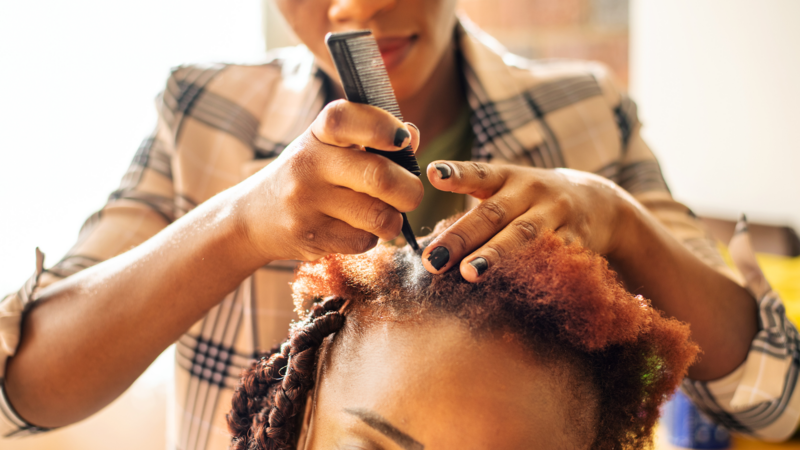A white woman who touts herself on TikTok as an “Elegance and Etiquette Coach” is facing backlash after categorizing Black women’s hairstyles as “not elegant.” TikToker @Amira.Bessette, who has more than 350,000 followers, is known for making videos reviewing everything from fashion to hairstyles, deeming them either “elegant” or “not elegant.”
However, a since-deleted video of hers has come under fire for featuring afro-textured hairstyles, identifying Afro puffs, short curly hair, Bantu knots, low kinky-curly buns and ponytails as “not elegant” compared to, for example, long wavy hair.
The video quickly made its rounds across social media, stitched by other TikTokers and screen-recorded, then posted to different platforms. Because Amira claimed she “was trying to be inclusive,” users were quick to spot an initial comment under the original video stating she would not be apologizing.
@melaninteach1 #stitch with @amira.bessette the yts have to be stopped! #naturalhair #eleganthairstyles
White female TikTok user Laura, who goes by the handle @big.meech_, condemned Amira’s conduct: “You owe the Black community an apology expeditiously,” she said in a video response.
Laura went on to give a scathing criticism of Amira’s actions as harmful to a community that historically has faced various iterations of discrimination, including against their natural hair.
@big.meech_ Stitch w/ @amira.bessette YT women, let’s stay in our own lane!
“Either you are completely ignorant to the ways in which Black people and Black women specifically have historically and continue to be policed for their natural hair, or you are aware, and you made the video anyway,” user @big.meech_ responded.
The outrage was palpable as users spoke out against the video.
“She intentionally chose photos of Black women to [antagonize] us,” one person commented. “She ain’t slick. Nothing ‘inclusive’ about what she did.”
“I’m a Black woman, and I was literally DENIED JOBS for wearing my natural hair out. I had to slick my hair down into a bun to get a job,” another user said.
She isn’t the only one.
Dove partnered with LinkedIn to commission the 2023 C.R.O.W.N. Research Study, which found that Black women’s hair is 2.5 times more likely to be deemed unprofessional. Bias against natural hair and protective styles negatively impacts how Black women approach the hiring process.
In fact, an estimated 66 percent of Black women change their hair for a job interview, while 54 percent feel they must wear their hair differently to succeed at work. Additionally, Black women with “coily” and textured hair are twice as likely to experience microaggressions in the workplace than Black women with straight hairstyles.
The nationwide campaign for the C.R.O.W.N. Act, or the Creating a Respectful and Open World for Natural Hair Act, began in 2019. It aimed to “ensure protection against discrimination based on race-based hairstyles by extending statutory protection to hair texture and protective styles…in the workplace and public schools.”
While California was the first state to enact formal legislation, 19 other states have since adopted and signed the legislation into law. Although the House of Representatives passed a federal measure to make the act a national law in 2022, the bill failed to pass the Senate.
GOOD NEWS: The #CROWNAct is headed to the governor to be signed into law!
This is a huge win for our communities — thanks to the tireless advocacy of so many.
No Texan should face discrimination because of how we wear our hair.
— ACLU of Texas (@ACLUTx) May 13, 2023
Amira eventually posted a video which has also since been taken down.
“I apologize for a video I made calling Bantu Knots not elegant. My intention was to be inclusive in my elegance content; however, I went about it the wrong way. My [impact] was harmful as I was ignorant on the topic of Afro-textured hair. I’m grateful to all kind Black women who took their time to educate me on the topic,” she wrote.
Unfortunately, social media — and rightfully so — has yet to be forgiving of what’s been regarded as a tone-deaf apology.
“You put about as much time and energy into this apology as you did into researching Black women’s hair,” one user responded in a video.
@xrizztina #stitch with @amira.bessette half hearted inclusivity and apologies always go hand in hand. Let’s do better and if you’re not going to do your best , let’s not do it at all. #blkhair #wochair
“halfhearted inclusivity and apologies always go hand-in-hand. Let’s do better, and if you’re not going to do your best, let’s not do it at all,” another wrote in the caption of her video response.

